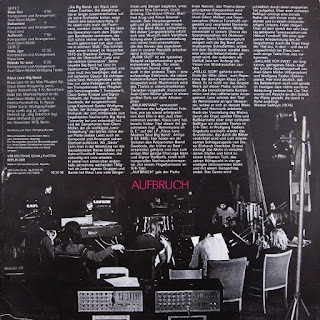Line-Up:
Trumpet, Flugelhorn – Charles Green, Klaus Lenz
Trombone – Bertl "Harisharan" Strandberg, Meinolf Humpert
Tenor Saxophone, Soprano Saxophone – Norbert Stein
Alto Saxophone, Sopranino Saxophone – Zbigniew Namyslowski
Electric Bass – Jochen Schmidt
Guitar – Stefan Diez
Piano, Synthesizer [Arp], Electric Piano [Fender] – Mike Herting
Drums – Stefan Krämer
Looking at the lineup above, it's hard not to think we're going in circles. First of all Klaus Lenz was featured here with Fusion and earlier with Modern Soul Band, twice. His two 1970s fusion albums are masterpieces, I put them here (Aufbruch und Wiegenlied).
Then, sax player Namyslowski was featured here with Jasmine Lady.
Norbert Stein was in the remarkable EP I ripped called No Nett back here, which I still love dearly.
The amazing Jochen Schmidt made a beautiful, just beautiful album in 1986 called New York Evenings posted there at that link, earlier.
Finally Mike Herting made the album about the amazon (the rainforest, not Jeff Bezos' empire) and Brazil here.
Something like a dozen albums related by musician to this post in total.
Stefan Diez, btw, made a great fusion album called Mirrors (in 1978) which I should've posted here but didn't and I'm hoping you all have that one already and are well familiar with it.
With this true all-star band you expect miracles, and it's close to a miracle indeed. Consider the track called Unit which opens up the second side, with its big band arrangement that moves through such great sounds and riffs, btw this is a Klaus Lenz chart:
And the beauty of this record is that it's full of great ideas and compositions, perhaps because many contributors provided material. The title track for ex. is by Namyslowski:
I'll let you discover the rest yourselves.















